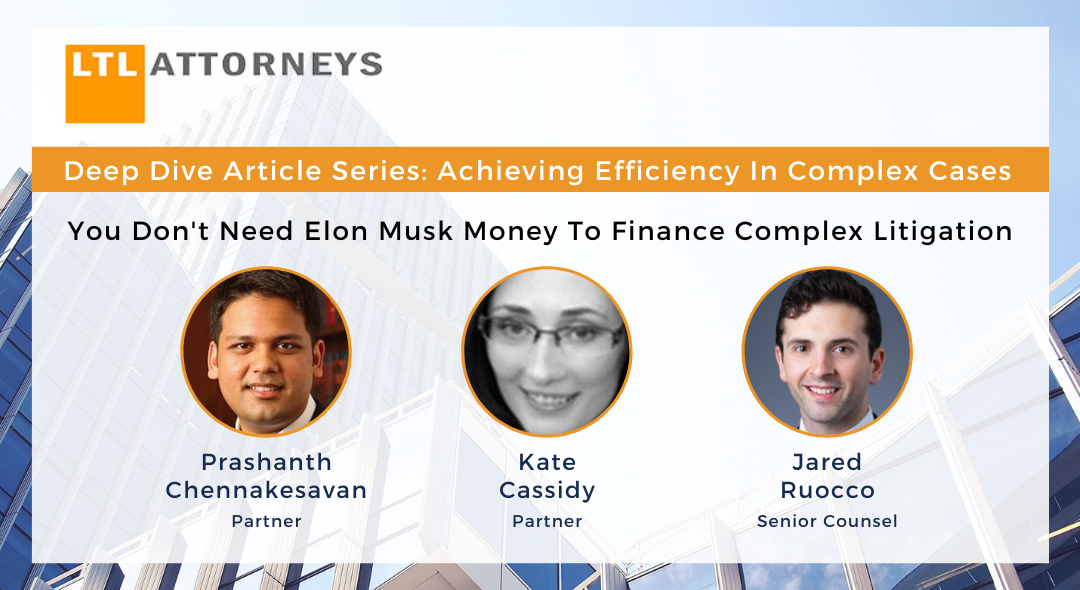
You Don’t Need Elon Musk Money To Finance Complex Litigation
Wachtell’s invoices to Twitter have been making their rounds on social media to much sarcasm and outrage. For many, the eye-popping amounts and the pages of 15- and 20-hour billing entries raise questions. We can’t comment on whether those lawyers really worked such long days, and there are other issues at play in that case that will have to be litigated, including questions about scant billing descriptions and an alleged improper after-the-fact bonus. Notwithstanding these other issues, it is not unusual for attorneys in mega cases to bill high volumes of hours. Especially when a case is on an expedited schedule, as the Twitter case was.
Cases getting press like this can leave companies and their investors wondering—is it worth it? Can we have our day in court without breaking the bank? Expending tens of millions on legal fees may make economic sense, and in fact may be necessary, in ultra-high stakes litigation, where there are billions involved.
For smaller companies, and investors who focus on them, a $10-, $20-, or $50-million dispute can be a make-or-break matter, and these parties need a different approach. Fortunately, there are efficiency-focused litigation strategies that can be employed without sacrificing quality. If your company has an important litigation, here are some high-level strategies to put your best case forward and remain economical.
- Select a Team of Experienced Trial Lawyers. Complex cases have many moving parts and complicated workstreams, all proceeding in tandem and interdependently. This complexity often results in important tasks being delegated to less experienced junior attorneys. But there is an alternative. A handful of experienced trial attorneys can often leverage their experience and judgment to provide your company with creative and more efficient advocacy. So, when selecting counsel, ask which attorneys will be staffed on your case, what their responsibilities will be, and how much relevant experience they have.
- Stay Focused. Judges’ and juries’ attention spans are limited and every trial—including the most complex—turns on a handful of documents and witness admissions. By spending time at the outset interviewing key witnesses, lawyers can often identify the most critical evidentiary issues at the beginning of the case, craft a litigation strategy designed to accentuate or resolve those issues and develop a case administration plan that dedicates resources to the most pressing issues. Having such a plan helps guide the team more efficiently towards trial.
- Employ Technology to Create Efficiency. While dramatic courtroom scenes capture people’s imagination, preparing a case for trial involves a lot of mundane, rote work. Discovery alone often involves the review and production of hundreds of thousands of documents and the preparation of hundreds of pages of written requests, responses, and objections. This work can often be streamlined and economized with the assistance of advanced litigation technology, particularly new systems that utilize AI. Incorporating this technology into your company’s trial plan can achieve significant cost savings for you or your company.
- Explore Alternative Fee Arrangements. Traditionally, clients pay their attorneys an hourly billable rate for the work they do. But that model is not necessary for every client or every case. Creative alternative fee arrangements can be an effective way for you or your company to tie results to litigation fees and costs. Such alternatives can be more than just the traditional contingency arrangements (where lawyers take an agreed-upon percentage of the clients’ recovery, either through settlement or judgment). Your company may be more interested in other alternatives such as a “flat fee” (a set fee for each phase of the case) or a “hybrid” contingency (a discounted hourly rate combined with a pre-determined “success” fee if the attorneys achieve a desired result). Such alternative fee structures are available to plaintiffs or defendants and can help align the attorneys’ incentives with those of the client and promote litigation efficiency.
A case like Twitter can make complex litigation seem prohibitively expensive. But small and midsized companies, and investors who focus on them, can also afford top-tier representation for their complex disputes.
More to Come. In our next article, we will provide an in-depth analysis of Delaware Chancery expedited litigation to help you understand the cost drivers for that specialized practice, beyond the jokes and memes circulating on the Internet. Then, we will explain the different ways your company can leverage technology to control litigation costs. Our final article in this series will explore the different fee alternatives that are available in complex commercial litigation. These installments will be available on LinkedIn, Twitter (now X), and Threads.
For more specific questions about the issues raised in this article, please do not hesitate to reach out to:
Prashanth Chennakesavan
Partner
prashanth.chennakesavan@ltlattorneys.com
Kate Cassidy
Partner
kate.cassidy@ltlattorneys.com
Jared Ruocco
Senior Counsel
jared.ruocco@ltlattorneys.com

